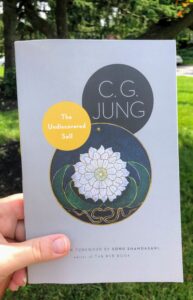
This week, I am beginning a nine-week deep dive into archetypal tarot, led by the brilliant tarotist Mariana Louis. (You can find her on YouTube, under the channel name Persephone’s Sister.) The foundation of Mariana’s archetypal tarot approach is the work of depth psychologist Carl Jung. I recently felt inspired to read Jung’s “The Undiscovered Self” (along with a friend) and thought I would share a few thoughts about its basic premise and main points, and how I have been digesting them.
The importance of the individual
In some ways, it feels like “The Undiscovered Self” has a pretty straightforward and uncomplicated premise: The individual human, and his internal experience, is the most important building block for a sane society. And also, even apart from society, his experience matters.
It’s a pretty basic premise, but also a radical one. Jung wrote “The Undiscovered Self” in 1956/57, when the pressures of social conformity and idyllic 50s standards were pretty high. (“Leave It To Beaver”, anyone?) Post-world war fears and Cold War tensions were running high too. And communism was considered a main threat to western society. So, considering when it was written, Jung’s emphasis on the primacy of the individual, on individual’s inner and instinctual experience, was pretty timely and pretty radical. I appreciated Jung’s reminder that the experience of one man cannot be reduced to an average or a statistic. To get to know him, you must let go of your general assumptions and approach him with an open mind.
Religion as the main tool to resist social pressure
Jung makes another interesting point about how to resist the pressures of the state and of “mass mindedness”. He says the key to social de-conditioning, to finding yourself, is religious experience. . . But not just any kind of religious experience. The key is to experience God, or the numinous, directly:
“Here each of us must ask: Have I any religious experience and immediate relation to God, and hence that certainty which will keep me, as an individual, from dissolving in the crowd?” -line 564
The important part here, though, is not the “brand” of relationship that the individual has with God (or the numinous). In other words, the type of religion doesn’t matter; an inner journey such as the Buddhist path of liberation, counts as much as a monotheistic religious experience. The IMPORTANT part is whether the relationship, or the felt experience, is a personal one. Jung would say that, if a religion is more about believing certain things, and performing certain prescribed actions/rituals, if it focuses primarily on attending community gatherings (rather than the private inner experience), then it is more of a “creed” than a religion.
“A creed gives expression to a definite collective belief, whereas the word religion expresses a subjective relationship to certain metaphysical, extramundane factors.” -line 507
So, I appreciated Jung’s reminder that it is important to go inward and to prioritize your own instinctual uncovering, and your own felt spiritual experience.🙂
The Problem of Evil (and healing “the split”)
Jung also emphasized that we need to be willing to acknowledge our own darkness, in order to heal the mass projections and “othering” that is the root of war. As individuals (and as a society!), we have the tendency to see evil as “out there” and to reject the shadow and unsavory aspects of ourselves. But we all have light and shadow, and we all need to bring gentle but unflinching awareness to our own thoughts and actions. We need to examine our flaws, to realize that we are imperfect–and that it is ok to be imperfect!–in order to heal and to find acceptance. The only way to stop “othering”, and perpetuating violence, is to be willing to see ourselves fully, warts and all.
“Recognition of the shadow, on the other hand, leads to the modesty we need in order to acknowledge imperfection. And it is just this conscious recognition and consideration that are needed whenever a human relationship is to be established. A human relationship is not based on differentiation and perfection, for these only emphasize the differences or call forth the exact opposite; it is based, rather, on imperfection, on what is weak, helpless and in need of support—the very ground and motive for dependence. The perfect have no need of others, but weakness has, for it seeks support and does not confront its partner with anything that might force him into an inferior position and even humiliate him.” (Line 579)
Self knowledge is the key
Overall, it feels like “The Undiscovered Self” is a rallying cry to connect to our humanness, our unique individuality, in its many shades and varieties. Jung encourages us to disconnect from the pressures of society, and to re-connect with God (or the religious/awakened impulse) within. He also reminds us to be humble, to be willing to acknowledge the “weaker” and darker aspects of ourselves. The more we become vulnerable, the more we embrace our “flaws” and accept them, the more we can come into relationship with others.
This book gives us the basic orientation for beginning the work of individuation. It encourages us to step out of mass consciousness, and how to begin the work of self examination. Even those of us who feel like we are already on the path of self knowledge, of inner work, could use this reminder and this encouragement. Our individual self work is also the path of healing our social ills! They are connected.
I love how Jung ends this short work, and so I will end with his own final words:
“I am neither spurred on by excessive optimism nor in love with high ideals, but am merely concerned with the fate of the individual human being—that infinitesimal unit on whom a world depends, and in whom, if we read the meaning of the Christian message aright, even God seeks his goal.”
🙏🏻✨💛✨


